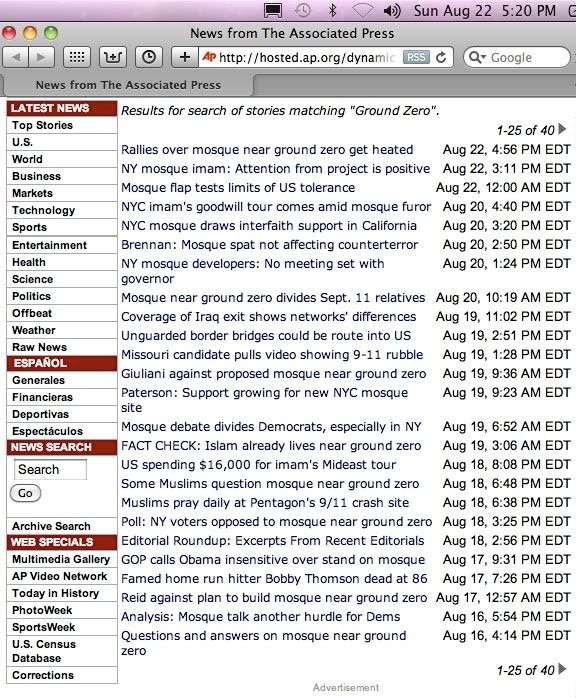By Tom Blumer
File this under "Fascinating Things You Learn When Researching Other Things."
The Associated Press's infamous memo huffing and puffing about how it will henceforth describe the 13-story mosque/community center/kumbaya center that Imam Feisal Abdul Rauf would like to have built on a site two blocks away from where the World Trade Center Towers once stood opened with this sentence:
We should continue to avoid the phrase "ground zero mosque" or "mosque at ground zero" on all platforms.Obviously the publicly announced editorial decision was news, but how about the lack of uppercase letters in "Ground Zero"?
It turns out that both the AP and the New York Times routinely do not capitalize "Ground Zero," making them grammar outliers. Here was one grammarian's take on the matter in 2007 (bolded in final sentence is mine):
Today's topic is capitalizing tricky nouns like Ground Zero, Internet, and Earth.Besides the Times, the AP is not in the grammarian's roster of "most people" who correctly capitalize "Ground Zero" as a specific place in Lower Manhattan. Perhaps they would prefer to be described at "the nyt and the ap."
Ground Zero
Since we're coming up on September 11th, I was thinking about Ground Zero, and I realized that sometimes I see the words ground zero capitalized and sometimes I don't. Back in 2001, it seemed as if the name Ground Zero got assigned to the site of the World Trade Center in New York almost immediately. Traditionally, ground zero means the site of a nuclear explosion, and sometimes it is used to refer to the site of a more general explosion or an area where rapid change has taken place. In those general instances, ground zero would be a common noun and wouldn't be capitalized. On the other hand, although there are a few dissenters, most notably the New York Times, most people agree that Ground Zero is the name of the specific site of the former World Trade Center, and therefore it's a proper noun that needs to be capitalized when it is used in that way.
This past Monday, referring back to something he wrote in 2002, the guy who runs TestyCopyEditors.com remined readers he doesn't like the use of the term "Ground Zero" in uppercase or lowercase:
"Ground zero" has a long history as a cliché but was occasionally useful in its original sense, meaning the point at which a nuclear explosion is triggered. To apply the term to the World Trade Center is to be needlessly vague about the nature of the attack. It also makes the term useless in its original sense, particularly in reference to the nuclear attacks on Hiroshima and Ngasaki, Japan, in 1945.That's interesting. Maybe the term's use first became popular in the establishment press once it was coined as a convenient shortcut to avoid using the the "T-word," as in "the site of the 9/11 terrorist attacks," or even to describe what occurred as "attacks" at all. If it was a strategy, it didn't work out particularly well. Virtually everyone knows that "Ground Zero" in a story about New York City is where the terrorist attacks occurred.
Here is a collection of current raw headlines found at the wire service's main site at 5:20 p.m. in a search on "Ground Zero" (not in quotes, but capitalized):

I count eight headlined instances of lowercase use of Ground Zero (the AP uses sentence case for its headlines). With the exception of one link to a multimedia item ("Plans for Ground Zero") and links to two videos ("Obama backs mosque near Ground Zero" and "Obama Supports 'right' for Ground Zero Mosque"), "Ground Zero" is in lowercase format at all relevant underlying AP items listed above.
So determined is the AP to keep "Ground Zero" in lowercase format that it revised the words in two paragraphs it directly quoted from a Rochester New Democrat and Chronicle editorial. The relevant paragraphs originally read as follows:
The controversy over building a community center and mosque near Ground Zero cuts so deeply to the core of this country’s founding that President Barack Obama was right to weigh in.In a roundup of editorials on various topics, the AP de-capitalized both uses of the term.
... That’s the rub. Many Americans view Ground Zero as hallowed ground, and building a mosque nearby seems beyond insensitive.
This after-the-fact revision of another publication's work seems to reflect a grim resolve that goes beyond the normal policing of grammar. If so, what's the source?
You'll have to excuse me for believing that business arrangements similar to those described here four years ago might have influenced the AP's original decision-making process:
Arab states have for decades paid substantial sums for control over content and other news-management privileges that I daresay would be refused at any price (with the mere request being treated as an earth-shaking scandal) if asked for by representatives of any Western country.Say it ain't so, AP.
Cross-posted at BizzyBlog.com.
—Tom Blumer is president of a training and development company in Mason, Ohio

